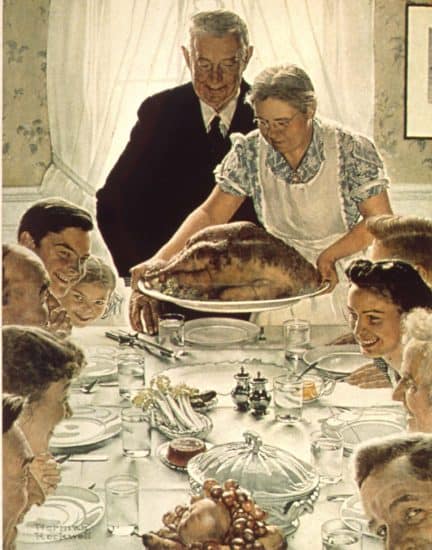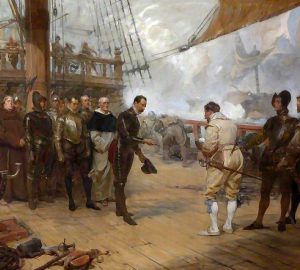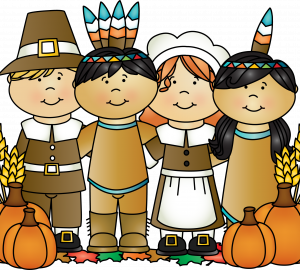
Gathering around the table for Thanksgiving dinner, coming down the stairs Christmas morning, or watching fireworks on the Fourth of July – for many of us, the strongest and best memories of our childhoods are of holidays. It may seem that the holidays we celebrated are dictated for us – we celebrate the days that our parents celebrated when we were young, or the days that the government or our boss gives us off from work. However, there is a more to holidays than meets the eye. They are a reflection of the values of a family or society, and they can be used by intentional parents to pass on their values to the next generation.
Passover
In Exodus 12, we find the birth of a holiday. There the scriptures record the institution of Passover – a feast that remains central to the Jewish calendar to this day. Some elements are familiar to us – special food was to be eaten, families were gathered together. But most importantly, the day had a message. The purpose of the Passover was for the people of Israel to remember how God delivered them from Egypt. As Exodus says:
So it shall be, when your son asks you in time to come, saying, ‘What is this?’ that you shall say to him, ‘By strength of hand the Lord brought us out of Egypt, out of the house of bondage.1
It was an opportunity, written into calendar, for parents to teach their children. Let’s consider how we can follow this example from Exodus in our own life and time, in a few ways.
A Reflection of the society’s values
No days are celebrated for no reason. Even if the reason has been forgotten, there is some history or motive behind it. Every society had holidays and those holidays reflect those society’s values. Israel was supposed to be a nation in service to their God and remembering their deliverance from Egypt would reflect that. The fact that for many years Passover was neglected, reflects the fact that the nation was not following the paths laid out for them in the laws of Moses.2
When a plot was foiled to blow up Parliament and kill King James I on November 5th, 1605, that day was established as a national holiday and a day of thanksgiving.3 This served clear purposes – to build reverence for the government and as a reminder of what would happen to anyone who tried to overthrow it.
In the United States, our biggest holiday is undoubtedly Christmas, with the average household spending over $1500.4 While it is a day that is traditionally a religious holiday, and some people do celebrate it primarily in that way, don’t be confused as to the current meaning of Christmas. For most Americans, it is a day dedicated to materialism. Whether as a child focused on what presents they will receive, or as an adult trying to make children happy with those presents, the focus is the same – happiness through material things. An apt holiday for a people who are abandoning Christian faith and turning instead to a secular and materialist world view, where nothing exists apart from this present life. If that is not how we want our children to look at the world, then we need to be intentional to lead our families in the opposite direction. This will show in the holidays we keep, and how we keep them.

A Teaching Opportunity
It was not long ago when holidays were an important teaching time. Today Presidents and Governors still issue official proclamations and sometimes even give speeches to mark the day, but few people pay any attention. But not too many decades ago, things were very different. A traditional 4th of July celebration wasn’t just listening to a band and then shooting off some fireworks. It was a time where the town gathered together to hear the Declaration of Independence read and listen to sermons or patriotic speeches.5 It was a time when the values and heroes of the country were clearly set forth.
Although most of our society has lost this, we can be different in our families. Use the holidays as an opportunity to remind your children of important lessons from history. Be proactive. Make a plan ahead of time to read a historical document or tell a particular story at a particular time of the day. If you make it a pattern to talk about the same things every year on that holiday, it will quickly become ingrained in your children’s minds as part of your family’s values.
Create Your Own Holidays
We should not feel constrained by the days the rest of our society chooses to remember. Any authority – federal, state, church, family or even individual, can set aside a particular day to remember or celebrate particular things. You can pick a day that has importance in your family or personal history, or a lesser known historical anniversary. As an added bonus, your schedule, as well as your friends and family if you choose to invite them, will be far more open on a holiday that you have chosen yourself. Use that day to give thanks, or teach your family stories of the past.
What do you want your children to remember when they are old? What do you want their memories of their childhood to be? Do you want it to be lying awake Christmas Eve waiting for presents? Sharing dinner with family and giving thanks to God on Thanksgiving? Discussing our country’s values and history before setting off fireworks on July 4th? Or perhaps going out for dinner every year and being told again of their parents’ story of conversion and new life in Christ? As parents, we have the opportunity to shape our children’s affections. Don’t let that opportunity go to waste.
1. Exodus 13:14, NKJV.
2. 2 Kings 23:21-22, 2 Chronicles 30:5.
3. “Observance of 5th November Act 1605 (3 Ja I, ch 1)“. Statutes at Large. IV. London. pp. 631–632.
4. Christmas Spending Statistics: Deck the Halls with Boughs of Money by G. Dautovic (Fortunly, 6/18/20)
5. The July 4 speeches that helped define what America is — or what it should be by David Shribman (Los Angeles Times, 7/3/20)




